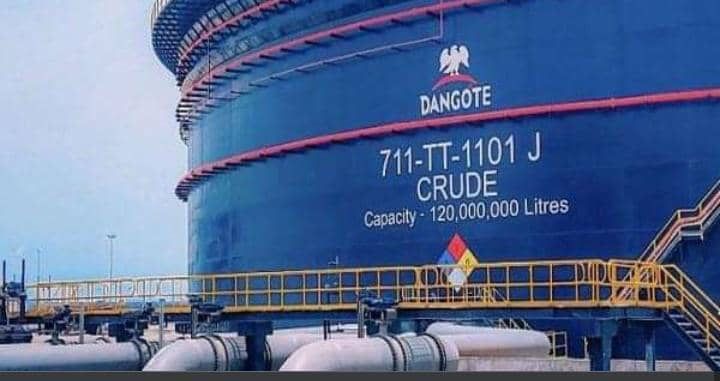
The Dangote Petroleum Refinery, located in Lekki, is preparing to increase its imports of crude oil as local supply from the Nigerian National Petroleum Company (NNPC) continues to fall short of its needs. Despite ramping up its production to 500,000 barrels per day (bpd) with an ambitious target of 650,000 bpd by mid-2025, the refinery is finding it necessary to look beyond Nigeria’s borders for feedstock.
Officials at the $20 billion facility confirmed that while the naira-for-crude deal, initiated by President Bola Tinubu, remains in place, the refinery’s growing demands require more crude than NNPC can provide from its current allocation of 450,000 bpd for domestic consumption.
“We are not saying that NNPC can’t supply crude, but the amount of feedstock we require daily exceeds what the NNPC can provide,” one refinery source, who requested anonymity, explained. The refinery’s production capacity of 650,000 bpd is a significant jump from its current output of 500,000 bpd, creating an urgent need for additional crude oil.
With the state-owned NNPC struggling to meet the rising demand for local refineries, Dangote’s plans to import crude become increasingly necessary. Officials from the refinery stressed that it is not about the NNPC’s capabilities but the sheer scale of the refinery’s operations, which are significantly larger than smaller, local refineries.
The Dangote Refinery, one of the largest in the world, is ramping up production while facing challenges securing sufficient feedstock. A consultant to the refinery highlighted its global standing, saying, “This is not about what NNPC can or cannot do. The game is for the big players. How many refineries of this size exist globally? Not many. This is a significant player on the world stage.”
Regarding the refinery’s fuel quality, the consultant emphasized the high standards, noting that Dangote’s Euro 5-standard petrol is contributing to better fuel efficiency in Nigeria. “The burn rate is lower because of the superior quality of the fuel being produced,” he added.
The Naira-for-Crude Deal and Supply Deficits
As Nigeria seeks to improve its refining capacity, a significant gap in crude supply has emerged. According to the Nigerian Upstream Petroleum Regulatory Commission (NUPRC), the Dangote refinery, alongside the Port Harcourt, Warri, and six other refineries, will require a total of 770,500 bpd of crude oil for daily operations. Currently, Nigeria’s refining capacity, factoring in only operational refineries, stands at 974,500 bpd.
The NNPC is already under pressure to allocate crude to local refineries, with an expected shortfall. Under the naira-for-crude arrangement, the NNPC is tasked with supplying about 385,000 bpd of crude oil to Dangote’s refinery, to be paid for in naira. However, this allocation is still insufficient to meet Dangote’s needs.
According to NUPRC’s forecasts, Dangote alone will require 550,000 bpd of Nigerian crude, amounting to 99.55 million barrels between January and June 2025, far exceeding the NNPC’s available supply. Meanwhile, smaller refineries like Port Harcourt and Warri are projected to require 60,000 bpd and 75,000 bpd, respectively.
The challenge of meeting local refinery needs is further compounded by Dangote’s plan to expand its crude storage capacity. The refinery is building eight additional storage tanks to accommodate more imported crude oil. With an expected increase in capacity by 41.67%, this expansion will bring the refinery’s storage capability to 3.4 billion liters, ensuring it can cope with the importation of crude while local supplies remain unreliable.
Devakumar Edwin, Vice President in charge of oil and gas at Dangote Industries, stated that the refinery is taking proactive steps to ensure adequate supply. “We have started building eight additional crude tanks to hold a billion liters, over and above our original storage capacity. Four of these tanks are nearing completion,” Edwin explained.
As Dangote looks to secure its supply of crude oil, experts predict that other refineries in Nigeria may also have to increase their importation of crude to meet production targets. The continued struggle to balance local supply with increasing refining capacity underscores the growing pressure on Nigeria’s oil and gas sector to address infrastructure challenges and meet both domestic and international demands.





